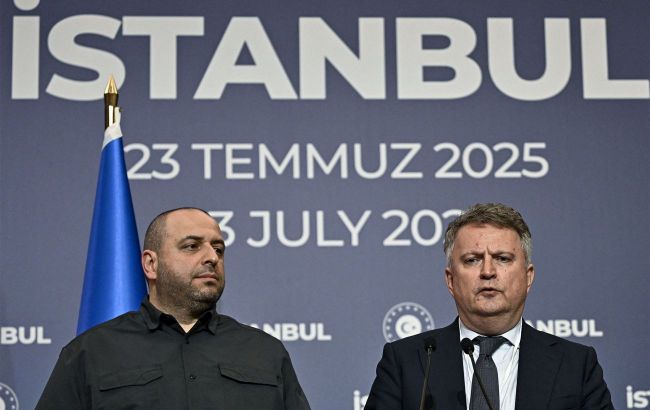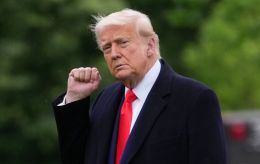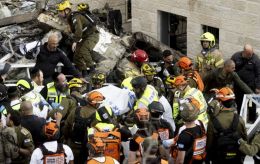Zelenskyy, Putin, and humanitarian track: Istanbul talks revealed
 Head of the Ukrainian delegation Rustem Umerov and First Deputy Minister of Foreign Affairs Serhii Kyslytsya (Photo: Getty Images)
Head of the Ukrainian delegation Rustem Umerov and First Deputy Minister of Foreign Affairs Serhii Kyslytsya (Photo: Getty Images)
The third round of negotiations in Istanbul between Ukraine and Russia has concluded. The two sides agreed to conduct another major prisoner exchange and issued a series of statements.
RBC-Ukraine summarizes the key outcomes of the third meeting.
Key takeaways:
- What will be the format of the new prisoner exchange?
- What was Ukraine’s main proposal?
- How did Medinsky respond to the proposal for a Zelenskyy-Putin meeting?
- Will there be new negotiations in Istanbul?
Summary of the Istanbul meeting from the Ukrainian side
At the final briefing, Secretary of the National Security and Defense Council Rustem Umerov, First Deputy Foreign Minister of Ukraine Serhiy Kyslytsya, Deputy Head of the Defense Intelligence Vadym Skibitskyi, and other members of the delegation spoke.
Key statements:
- The Ukrainian side does not exchange civilians and children - they demand their return. Civilians and children must simply be brought home.
- Over 1,200 people will be involved in the new humanitarian exchange.
- The humanitarian track will continue. Ukraine insists on an unconditional ceasefire. The humanitarian track and a leaders’ summit remain top priorities.
- So far, progress has been made only on the humanitarian front. There are still no developments regarding a ceasefire.
- Ukraine is always ready for a ceasefire, but Russia does not want it.
- Ukraine has proposed a summit between President Volodymyr Zelenskyy and President Vladimir Putin, with the participation of Turkish President Recep Tayyip Erdoğan and US President Donald Trump, to be held by the end of August.
- Today's meeting was less emotional, which set it apart from previous ones.
- The documents related to the ceasefire should not be called memorandums. Ukraine’s proposal is considered more realistic than Russia’s.
- The proposal for a meeting with Putin remains valid indefinitely, but for some reason, arranging the meeting is difficult.
Ombudsman representative Yuriy Kovbasa stated that the negotiations covered the exchange of prisoners held for over three years. Both sides agreed to maintain the current level of work. The next exchanges are expected to include young people, the wounded, and those seriously ill.
In response to a question about the memorandums, Foreign Ministry spokesperson Heorhiy Tykhyi emphasized that it's incorrect to call the documents memorandums. He explained that a memorandum is something agreed upon by both sides, whereas what they had were projects, proposals, and visions.
Summary of the Istanbul meeting from the Russian side
The Russian position following the talks was outlined by the head of their delegation, Vladimir Medinsky. According to him, Moscow also put forward several proposals:
- Both delegations should establish three working groups that will operate online. These groups will focus on political, humanitarian, and military issues.
- Short ceasefires of 24–48 hours should be declared on the front lines. This would allow medical teams to recover wounded soldiers and the bodies of the dead.
- The Russian side claims that Ukraine is allegedly holding 30 residents of the Kursk region and demands their return.
- Moscow is prepared to return another 3,000 bodies of the deceased and insists once again that all of them are fallen Ukrainian soldiers.
- Regarding the memorandums, the positions of the two sides remain far apart. However, contacts will continue.
Medinsky stressed that a summit between leaders requires a finalized peace agreement.
"At that meeting, we shouldn’t be discussing the agreement - we should be signing it. As we say, the end crowns the work," he said.
Meanwhile, today, the head of the Ukrainian delegation, Rustem Umerov, also commented on whether further rounds of talks would take place if a leaders’ meeting couldn’t be arranged by the end of summer.
According to him, the Ukrainian side has never refused to meet. People, a ceasefire, and a leaders’ summit remain priorities.
Turkish Foreign Minister Hakan Fidan also stated today that Ankara is ready to help monitor a ceasefire regime if Ukraine and Russia reach such an agreement. He urged both Moscow and Kyiv to make progress within the framework of the Istanbul talks.

